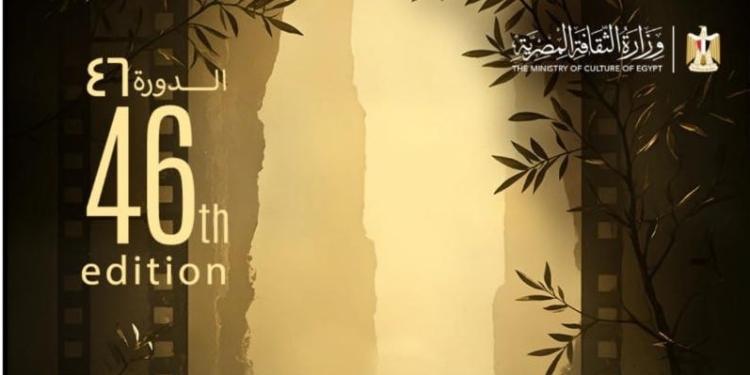Tomorrow, the Cairo International Film Festival (CIFF) will raise the curtain on its 46th edition, taking place from November 12 to 21, 2025. The program promises a rich and diverse selection, deeply anchored in humanity and artistic curiosity. True to its long-standing spirit of rigor and openness, this year’s edition embraces two strong directions: celebrating auteur cinema that listens to the world, and treating memory as a living, shared force.
The tone is set by the International Competition jury, chaired by Nuri Bilge Ceylan, one of today’s most revered filmmakers, whose work—from Winter Sleep to About Dry Grasses—examines silence, time, and the inner landscapes of the human soul. Joining him are Tunisian director Leyla Bouzid, Egyptian actress Basma, Egyptian filmmaker Nadine Khan, Italian editor Simona Paggi, Chinese director Guan Hu, and Romanian filmmaker Bogdan Mureșanu. Together, they will evaluate twelve films that explore memory, resistance, love, and solitude.
The international lineup reflects this aesthetic vision, bringing together films from across the globe. Maryam Touzani’s Calle Málaga extends the intimate tone of The Blue Caftan, following a woman torn between duty, desire, and guilt. Félix Dufour-Laperrière’s Death Does Not Exist, a visually stunning animated poem, questions the fragile border between presence and absence. Paul Andrew Williams’ Dragonfly delves into compassion and redemption through a family tragedy. Representing Tunisia, Mehdi Hmili’s Exile follows a man struggling to rebuild his life after prison in a society fractured by injustice. In Once Upon a Time in Gaza, brothers Tarzan and Arab Nasser blend dark humor and defiance in the face of devastation. One More Show by Mai Saad and Ahmed Eldanf pays tribute to theatre artists who keep performing amid crisis. Gabrielė Urbonaitė’s Renovation uses a house under reconstruction as a metaphor for the erosion of love and time. Sand City by Mahde Hasan offers a poetic yet raw observation of everyday lives in contemporary Bangladesh. Nicolas Khoury’s Souraya, My Love revisits the modern Lebanese condition through a tender, melancholic love story. Marta Bergman’s The Silent Run follows a migrant woman seeking to rebuild her life far from war, while Peter Sant’s Zafzifa closes the selection with a meditative, dreamlike reflection on nature and solitude.
Tunisian cinema enjoys a particularly strong presence this year. Leyla Bouzid serves on the international jury, while Mehdi Hmili’s Exile competes for the Golden Pyramid. In the Horizons of Arab Cinema competition, two Tunisian features stand out: Round 13 by Mohamed Ali Nahdi, a moving family drama exploring illness, vulnerability, and resilience; and Looking for Aida by Sarra Abidi (Tunisia, 2025, 89 min), set in a call center where Ayda’s routine is disrupted by the sudden departure of a long-time colleague. Torn between regret and self-discovery, she begins a quiet reflection on time, love, and the meaning of life. Through this delicate female portrait, Abidi crafts an introspective and emotionally restrained film. Adding to Tunisia’s strong presence, Sarra El Abed’s Goodbye Party is among the projects selected for the Cairo Film Connection, underscoring the creative vitality of Tunisian cinema across all festival sections.
One of the festival’s most symbolic moments will come with the closing film, The Voice of Hind Rajab by Kaouther Ben Hania, inspired by the Palestinian tragedy that shook the world in early 2024—the story of a six-year-old girl killed by the Israeli army in Gaza while calling for help, alongside several members of her family who were also shot dead in the car. By choosing this film, the festival places Palestine at the heart of its closing image: a child’s cry turned into a symbol of lost innocence and the violence of our times. The choice reaffirms cinema’s role as witness, and the festival’s position as a voice for the Arab world.
The CIFF 2025 will also pay tribute to four major figures in world cinema: Mohamed Abdel Aziz, a master of Egyptian social comedy; Mahmoud Abdel Samie, the cinematographer and documentarian who chronicled half a century of Egypt’s visual history; Hungarian director Ildikó Enyedi, known for her poetic and contemplative style—her latest film, Silent Friend, will screen out of competition; and Palestinian actress and filmmaker Hiam Abbass, honored for a career that bridges Arab and Western cinema. Each will receive the festival’s Golden Pyramid for Lifetime Achievement, a trophy that unites heritage and modernity.
Among the festival’s most beloved sections, Cairo Classics celebrates the restored masterpieces of Egyptian cinema—works by Youssef Chahine, Salah Abu Seif, Kamal El Sheikh, Barakat, and Hassan al-Imam—while also engaging in a dialogue with international auteurs such as David Lynch, Diane Kurys, and Sam Kadi. The rare Iraqi film Sa’eed Effendi (1956) will also be screened, anchoring this section in both restoration and pedagogy. Workshops and panels on digital restoration, organized with Coventry University, further highlight the festival’s commitment to preserving cinematic memory.
The FIPRESCI centennial will be marked by a showcase of twenty-five key Egyptian films from the first quarter of the 21st century, including I Love Cinema by Osama Fawzy, Messages from the Sea by Daoud Abdel Sayed, Heliopolis Apartment by Mohamed Khan, Microphone by Ahmad Abdalla, and The Yacoubian Building by Marwan Hamed. Together, they offer a vivid map of Egypt’s modern cinematic identity.
Looking ahead, the festival launches Cairo’s XR, its first-ever section devoted to immersive storytelling—virtual reality, AI-based experiences, and interactive installations—inviting audiences to experience new ways of seeing and feeling cinema.
On the professional side, Cairo Pro-Meet, organized under the Cairo Film Market, becomes the new hub for mentorship, industry exchange, and international coproduction, extending the momentum of the Cairo Film Connection and reinforcing CIFF’s position as a key professional platform in the Arab region.
Finally, this year’s official poster, depicting a dove carrying an olive branch, embodies the festival’s spirit—a message of peace and hope in a world still torn by conflict. By uniting memory, innovation, commitment, and openness, the Cairo International Film Festival 2025 reaffirms its role as a meeting place for cultures, a dialogue between cinemas, and a living testament to the enduring power of art.
Neïla Driss








